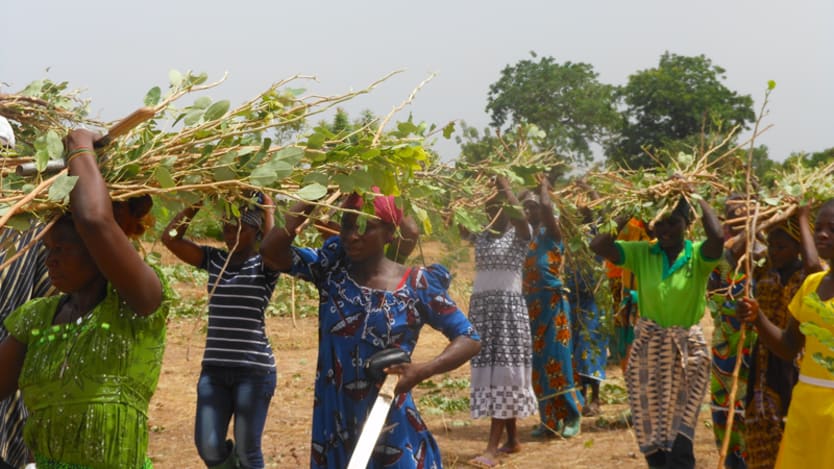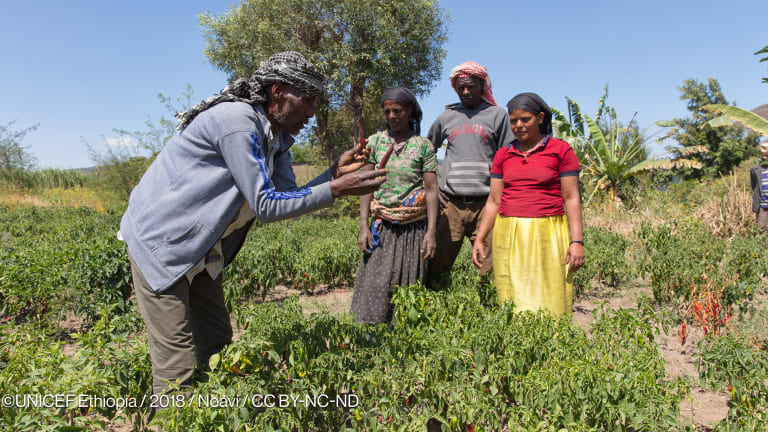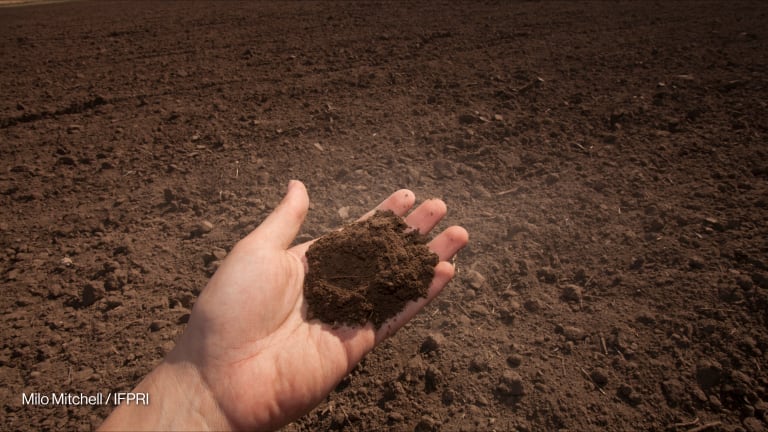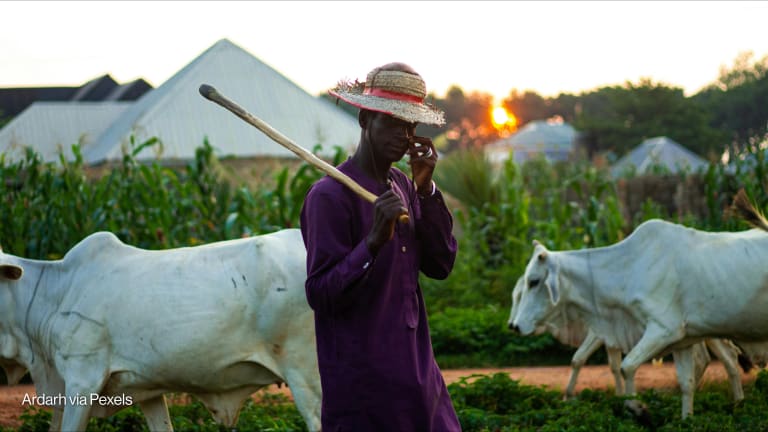
The process of allowing trees to regenerate and nourish cropland without agrochemicals sounds simple — yet is as powerfully disruptive of an idea as the iPhone.
Farmer-managed natural regeneration is an agroforestry and agroecology technique in which native trees are carefully selected and left to grow on land often razed bare. Leaves decompose and become fertilizer; roots fix nitrogen and build up soil structure and microbiology. Carbon is sequestered, soil retains moisture, and firewood — often scarce — is within easy reach through repeated pruning.
“Farmer-managed natural regeneration is one of the only innovations that can shield crops from extreme heat.”
— Daniel Moss, executive director of the AgroEcology FundWith the Sahel desert encroaching from the north and temperatures projected to rise, farmer-managed natural regeneration is one of the only innovations that can shield crops from extreme heat by providing partial shade. It is a very real form of resilience.
It's hard to imagine a simpler, more appropriate technology to combat climate change, improve yields for millions of struggling farmers and make headway on the United Nations Sustainable Development Goals. Farmer-managed natural regeneration is affordable — it requires no external inputs — and preserves local biodiversity that yields traditional foods and medicines.
Evidence of this management’s rapid spread — generally locally-led rather than due to foreign funding — has been demonstrated by satellite imagery. The World Agroforestry Centre has found that more than 46 percent of the worlds’ agricultural land has greater than 10 percent tree cover and that this number could be increased dramatically.
Agroforestry could also offset greenhouse gas emissions, helping to make agriculture part of the solution to climate change — without seizing land from rural populations for large-scale reforestation projects to create carbon sinks. Significantly, farmer-managed natural regeneration is not associated with kind of health and environmental controversy that accompanies the Monsanto-Bayer chemical packages.
And yet, there is controversy.
A mismatch between evidence and narrative
Strategies to feed the world vary considerably. On the one hand, agroindustry subscribes to the Green Revolution, insisting that their proprietary technologies — chemical pesticides and fertilizers, genetically modified seeds and precision tractors — are essential to eradicating hunger. On the other hand, civil society organizations such as the Centre for Indigenous Knowledge and Organizational Development in Ghana claim that solutions lie in farmer-led agroecology and affordable technologies that are part of the commons. The center's ally, a West African women's agroecology network, boldly calls itself, “We Are the Solution.”
“Rather than treating soil like a strip mine, these practices regenerate microorganism biodiversity in soils that strengthens its fertility.”
—Farmer-managed natural regeneration places ecological insights at the center of agriculture. It is based on hard science and on-the-farm experimentation, with its roots in the practices of farmers who know their land and crops and the scientists who work with them to improve their sustainable agricultural practices.
A 30-year-long comparison by the Rodale Institute of organic and chemical agriculture in the production of corn and soybeans found that, after an initial decline in the first few years of the transition from chemicals, the organic method “rebounded to match or surpass the conventional system.” And rather than treating soil like a strip mine, these practices regenerate microorganism biodiversity in soils that strengthens its fertility.
Representatives from more than 70 countries recently gathered in Rome at the Food and Agriculture Organization to discuss an agroecological approach to a healthier and more sustainable food system. It was an invigorating and encouraging gathering, made more so when José Graziano da Silva, the director-general of FAO, called for “transformative change toward sustainable agriculture and food systems based on agroecology.”
Ghanaian practitioners hope that expressions such as this from within FAO will grab the attention of the Ghanaian government and encourage a shift in national agricultural policy.
And yet the agroindustry's Green Revolution narrative is powerful. It tends to paint agroecology as quaint and anti-modern — while at the same time using agroecology principles in its sustainability claims — and has an outsized influence on popular thinking and policymakers. Why? It may have something to do with a $5 trillion agribusiness industry spending heavily to win over scientists, politicians, and consumers.
No doubt fascination with gadgetry plays a role. Although the definition of technology is the practical application of scientific knowledge, in the frenzy of apps and venture capital, it is easy to forget that technological innovation doesn't just come from white-coated engineers but from farmers managing tree cover to boost bean yields and soil moisture.
When the right technology is trees, wells, and wheelbarrows
Around the world, approximately 2.5 billion family farmers still grow 70 percent of the world's food. More than 800 million people, many of whom are small farmers, face hunger. Monsanto waxes humanitarian in their marketing, and yet, to eradicate hunger among small farmers — a significant percentage of the world's hungry people — it seems to make little sense to hook farmers on expensive chemicals that degrade the soil and require ever-increasing application, when there are no-cost ecological processes and low-cost tools that produce sufficient yields and regenerate soil.
The technologies that these farmers need to increase yields and save labor are not patented seeds and pesticides, but trees, wells, and wheelbarrows.
“One thing agroindustry could do for small farmers is to quit lobbying governments to subsidize their products.”
—Industry representatives argue that their products help farmers enter the global supply chain — export markets where they can earn more. But many small farms are not generating crops that will make it to the likes of Walmart shelves. Were the agroindustry genuinely interested in feeding the world, a more effective strategy — and less self-serving — would be to support the revival of small farmer livelihoods based on local foods and markets. But that would be asking them to fold up their lucrative business.
Growing food on favorable policies
One thing agroindustry could do for small farmers is to quit lobbying governments to subsidize their products. Farmer-managed natural regeneration and other agroecological approaches require a favorable policy environment to prosper.
Subsidies in Ghana and other countries — over $1 billion across sub-Saharan Africa — frequently promote chemical agriculture at the expense of agroecological approaches such as farmer-managed natural regeneration. Development banks and bilateral and multilateral development agencies often back these schemes as a way to boost productivity — and increase business for United States and European agricultural input manufacturers.
In rural India, tea is gaining sustainable development ground
Tea estates in India have long been associated with the impacts of deforestation, wildlife conflict, and exploitative work conditions. But several tea growers and researchers are experimenting to ensure it delivers for people, wildlife, and the environment.
For farmer-managed natural regeneration and other agroecological practices to flourish, public subsidies must be removed from imported chemical inputs and invested in agroecology. The Centre for Indigenous Knowledge and Organizational Development works closely with the national Peasant Farmer Association of Ghana to turn the perverse subsidy structure upside down. They press the Ghanaian Ministry of Agriculture to support local manufacturing of organic fertilizers, offer training for proven technologies, such as farmer-managed natural regeneration, and make loans for basic production-enhancing inputs like wells and wheelbarrows.
The Centre for Indigenous Knowledge and Organizational Development and Peasant Farmer Association of Ghana are part of the continental network — the Alliance for Food Sovereignty in Africa — which likewise urges the African Union and African states to pass fair seed laws that don't criminalize farmers' traditional methods of seed exchange in favor of importing genetically modified and patented hybrid varieties.
Alliance for Food Sovereignty in Africa is a close ally of La Via Campesina, a global network whose 200 million-odd smallholder farmer members push for policies that favor agroecology everywhere. La Via Campesina lifts up state policies like those of Andhra Pradesh, India, which has committed to supporting the conversion of 500,000 farmers to agroecology through a program called Zero Budget Natural Farming.
Investments and alliances for agroecology
Support for agroecology ought to be the norm rather than the exception. The United Kingdom Department for International Development only supports agroecological projects in less than 5 percent of its agricultural aid and in less than 0.5 percent of U.K.'s total multibillion aid budget since 2010.
I work with the AgroEcology Fund, a multidonor pool that supports practitioners and advocates of agroecology around the world. As the donor community grapples with how best to nurture a sustainable food system for people and the planet, the number of our affiliated foundations has grown rapidly.
We are united not only in growing the fund but in advocating for the donor community at large to shift funding from conventional input-heavy agriculture and less rigorous forms of sustainable agriculture to agroecology practices, policies, and markets. We subscribe to true cost accounting principles — an analytical tool that looks at multiple bottom-lines simultaneously and shows that agroindustry's singular pursuit of yields puts future generations in peril.
Alliances are critical. Agroecology techniques, such as farmer-managed natural regeneration, bring together traditional forest conservationists, climate change funders, and indigenous peoples.
Search for articles
Most Read
- 1
- 2
- 3
- 4
- 5








